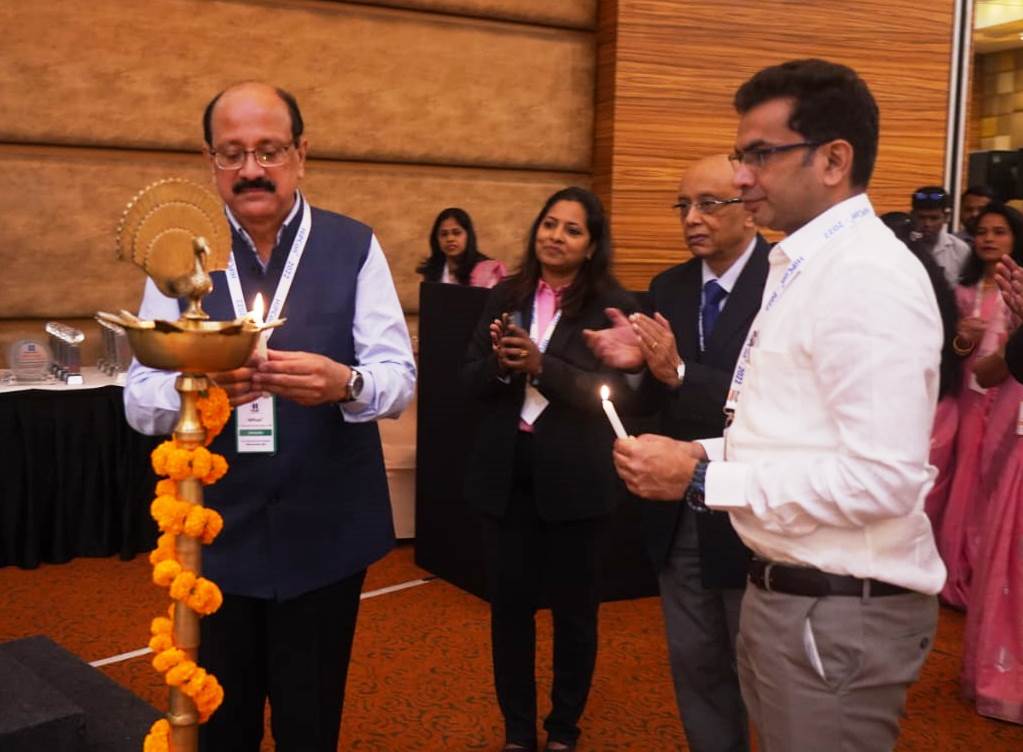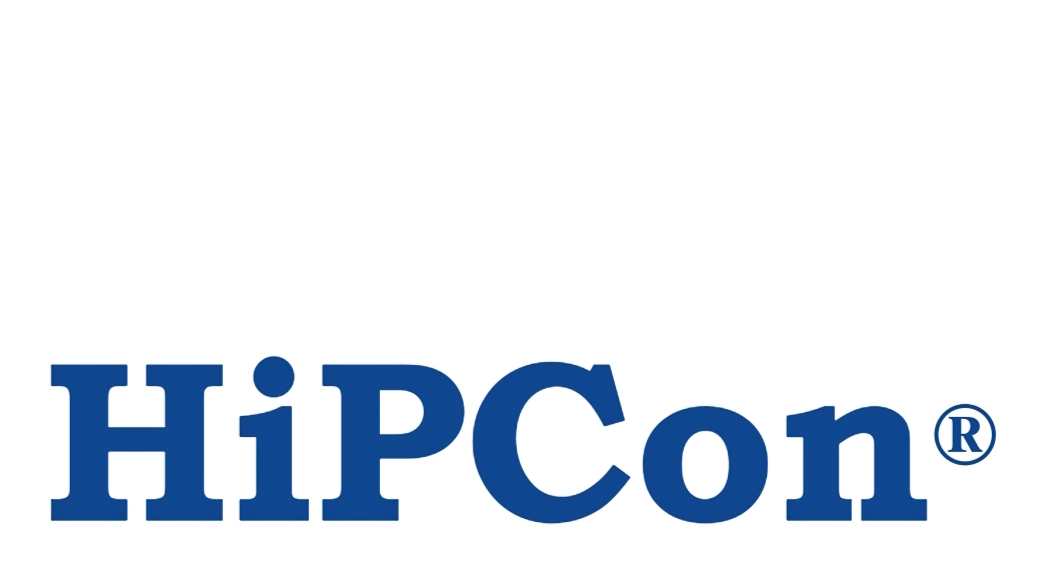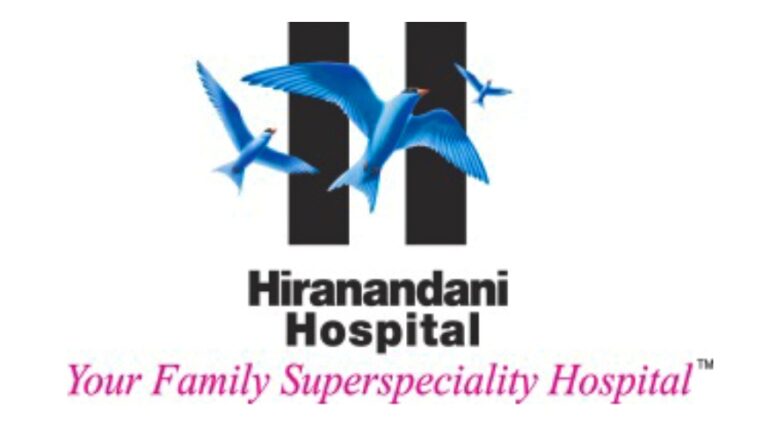
Dr Atul Kumar Nasa lighting Lamp, Manisha Pal, Dr Sujit Chatterjee, Dr Vivekanandan Kalaiselvan & Dr Subhrojyoti Bhowmick

HiPCon 2022
MUMBAI 5th DECEMBER, 2022 (GPN): The 9th Hiranandani Pharmacy Conclave (HipCon 2022) was held recently in Mumbai with an initiative of Dr L H Hiranandani Hospital, Mumbai. The participants at a day-long Conclave included Pharmacists, Clinical Pharmacists and Doctorate in Pharmacy, Pharma Students from across Maharashtra, and a few from other states.
‘HiPCon 2022’ was a day-long conclave organized to share and exchange knowledge on the importance of Pharmacy services and Practice in hospitals considering the theme “Pharmacist: Shifting towards Patient Centric”. The objective is to describe the broad range of Patient Care and Quality Services provided by the Pharmacist. The pharmacist along with the prescriber can best improve the situation by making appropriate use of antibiotics followed by professional associations and patient communities. A periodic assessment of antibiotic use for the treatment of infection should be performed to determine the quality of antibiotic use.
After formally inaugurating the Conclave at the hands of Dr Sujit Chatterjee, CEO – Dr L H Hiranandani Hospital, and Ms Manisha Pal– Pharmacy In-charge and Organizer of HiPCon 2022, Dr Sujit Chatterjee addressed the Pharmacists on Pharmacist’s Role in Patient Safety. He highlighted how registered pharmacists, especially those engaged in public health work, can enlighten the public concerning regulations and measures for the prevention of epidemic and communicable diseases. At all times, registered pharmacists shall notify constituted public health authorities of every case of communicable disease under their care, in accordance with the laws, rules, and regulations”.
Ms Manisha Pal spoke about how the Pharmacy profession has evolved from traditional drug focused to the patient-focused. How Pharmacists are actively involved in the treatment procedure, and how measures are taken by them at different levels to avoid harm during the treatment. In the past, pharmacists were responsible only for dispensing medicines. Gradually, the traditional role of pharmacists has been expanding, and now an increasing number of pharmacists are playing a role as vital team members in the direct care of patients, especially the new generation of pharmacists who are PharmD, who mainly focus on patient safety, which is a need of the hour.
Mr Sandip Dey working as Chief Business Officer for Akumentis Healthcare Ltd & Nicholas Healthcare Ltd covered the topic Indian Regulation & Guidelines for Drug Market. Mr Dey presented the complete picture of Pharma industry – its size, growth rate, prospect and key players in the industry. He highlighted on how Pharmacovigilance is important in assuring the safety of medicines and protecting patients from harm. He explained the role and functions of The Central Drugs Standard Control Organization (CDSCO) which is the Central Drug Authority for discharging functions assigned to the Central Government under the Drugs and Cosmetics Act. CDSCO headed by the DCGI is responsible for the drug regulatory framework in India. He also explained which authorities issue various licenses at different level.
Ms Manjiri Gharat – Vice president International Pharmaceutical Federation (FIP) & Vice president of the Indian Pharmaceutical Association (IPA) highlighted her views on topic Infectious Disease Pharmacists: Imperative for mitigating AMR and fostering AMS. According to Ms Manjiri for AMS at the healthcare facility level, active involvement of clinical leaders and cross-specialty engagement are crucial for its success, particularly the role of the clinical pharmacists. India is one of the few countries worst hit by AMR-antibiotic-resistant neonatal infections alone are responsible for the deaths of nearly 60,000 newborns each year. Globally, India tops the list of countries with the highest antibiotic consumption, and highest AMR occurs. Irrational Use is the central driver of AMR in our country. According to Ms Manjiri, the Key Strategy to optimize antimicrobial use is to create awareness/understanding of AMR through effective communication, education, and training, reduce the incidence of infection through sanitization, hygiene, and infection prevention measures, Optimize the use of antimicrobial agents in human and animal health. Ms Gharat also highlighted a new initiative taken by the Indian Pharmaceutical Association (IPA), which is the Infectious Disease Fellowship Project. The primary aim of this initiative is to develop and establish the concept of ID Pharmacists in India by training pharmacists who can effectively contribute.
Dr Zarine Khety heading Purchase Dept at Saifee Hospital spoke on topic “Healthcare Supply Chain Challenges and How to Avoid Them”, she focused on how the supply chain for healthcare is distinctive to the distribution networks of any other industry.
Dr Austin Fernandes a psychiatrist at Dr L H Hiranandani Hospital with more than 10 years of experience in the field covered the topic “ Invest In Selfcare”, From pampering to medical check-ups and to indulging occasionally…you need to keep in focus. Here Dr Fernandes explained that Self-care refers to activities undertaken to enhance energy, restore health, reducing stress. As healthcare workers how we can overcome stress and look after ourselves Doctor asks us to take breaks, give yourself “me time.” Learn that taking time to yourself for rejuvenation and relaxation is just as important as giving time to other activities.
Dr. Vithya Thirumoorthi who is Professor and Head of Department of Pharmacy Practice, Al Ameen College of Pharmacy, Bangalore elaborated on Clinical Pharmacist Intervention in Resolving Drug Therapy Problems, clinical pharmacists perform various activities depending on the available resources and the health system, and TDM represents one of the fundamental responsibilities. According to Dr Vithya, Clinical Pharmacists should work in coordination with the doctors, nurses & pharmacists to achieve the goal of Safety in Patients. Clinical pharmacists participation in ward rounds with physicians and provide their suggestions or recommendations wherever needed.
Mr Joy Chakraborty, Chief Operating Officer, Hinduja Hospital covered the area which is widely recognized by WHO i.e. – Patient Engagement – Medication Safety. Mr Chakraborty highlighted how patients could make essential contributions to their safety and prevent errors and adverse events. Doctors have too little time to discuss medications with the patient. Patients leave without vital information such as risks, side effects, or when to stop the medication. Some medicines could lead to addiction or fatal errors if not well explained so Pharmacists need to take the lead and explain patients and patient relatives all about the medicines he is going to take.
Dr Lallu Joseph – Secretary General of the Consortium of Accredited Healthcare Organizations (CAHO), India. Dr Lallu spoke on a very important topic- Incident Analysis – Tool Towards Creating the Culture of Safety. She focused on why analysis of incidents is important, it is a process that helps organizations investigate the cause of an incident, determine its impact, and identify strategies to prevent similar occurrences in the future. She further mentioned a strong statement, A strong safety culture encourages reporting and transparency, which facilitates learning from incidents and near-misses. An incident report should have proper data collection. The content of the Incident report should have the proper Date and time of the report, the Date and time of the incident, and Where did it happen? Who was involved?, Category (Near miss/harm/sentinel event), Description (just facts- no personal opinion, no solutions) & Immediate action taken. This content will help to identify the proper root cause of the incident. She further mentioned that 25 to 50% of medication errors are not reported because of Blaming individuals instead of the system, Concerns over the consequences of reporting, Fear of punishment, Blaming nurses if patients are harmed, Incompetence, Too long and time-consuming reporting, Perceiving medication error as not important, No need to report if no patient is harmed.
There were numerous posters received for the Poster presentation competition. The poster presentation is the easiest way to create awareness and give a message to society.
Other Eminent Speakers who addressed the Pharmacist at the Conclave – Dr Atul Kumar Nasa – Ex-Head of Office, Controlling & Licensing Authority, Drugs Control Department, Delhi enlightened on topic: Involvement of Regulatory body in Patient Safety. Dr Vivekanandan Kalaiselvan – Senior Scientific Officer, Indian Pharmacopoeia Commission enlightened on the Role of Pharmacists in Monitoring and Reporting of Adverse Events: Scope and Challenges. The New Drug Discovery process and Clinical trial were discussed by Dr Subhrojyoti Bhowmick, Clinical Director, Peerless Hospital & B.K Roy Research Centre. Ms Yasmin Shenoy, Regulatory Affairs – Sanofi explains to the crowd – Are Bio-similars Destined to replace Biologics? Again, there was a Stress Relief session covered by Dr Harish Shetty, Psychiatrist, Dr L H Hiranandani Hospital. Dr Vimal Pahuja, Metabolic Physician at Dr L H Hiranandani Hospital spoke on the Impact of Medication Reconciliation for improving transitions of care.
There was Panel Discussion on an important topic – Challenges for Implementation of Anti-microbial Stewardship with the panelists – Dr Rahul Kamble (Microbiologist), Dr Neeraj Tulara (Physicians), Dr Narendra Patil (Microbiologists), Dr Nadeem Motlekar (Intensivist), Dr Kapil Adwani (Clinical Pharmacologist), Moderator – Dr Archana Chitnis (Microbiologist), Dr Praveen Kumar Dubey ( Clinical Pharmacologist), various point discussed were on benefits of AMS program, how AMS helps in infection control, how organization ensures that the antibiotic timeout documentation is completed, how de-escalation/escalation of antibiotics is captured in various organizations.
The conclave concluded with a vote of thanks to all speakers and participants by Dr Manish Gupta – Medical Director at Dr L H Hiranandani Hospital.
To know more about HiPCon 2022 please visit: www.lhh-hipcon.com
Dr L H Hiranandani Hospital, Hillside Avenue, Hiranandani Gardens, Powai, Mumbai – 400 076, India Ph: 2576 3333/ 3300, Fax: 2576 3311/ 2576 3344
Website: www.hiranandanihospital.org , Email: [email protected]


Be the first to comment on "Pharma Conclave ‘HipCon2022’ calls on Pharmacists to shift focus toward patient centricity and safety"